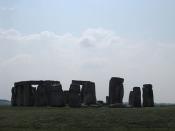Why was Stonehenge Built?
An historical investigation into the changing theories associated with the purpose of the mysterious Stonehenge.
Synopsis
Throughout the ages Stonehenge has remained as an indecipherable enigma despite numerous attempts by historians to determine for what Stonehenge was originally constructed. This essay explores the development of historical investigations and analyses the existence of proposed theories based upon the historians' purpose and the evidence used in the construction of these theories. Within the essay the following focus questions will be addressed: What are the theories? Who constructed these theories? How were these theories constructed? How has context influenced the theories? What are the differences within the theories?
These questions will be addressed in relation with time, context and purpose. Theories will be examined in chronological order beginning in the 12th century with Geoffrey of Monmouth's medieval theory and suggestion of a Roman temple by Inigo Jones in the 17th century through to the 18th century Druidical views of John Aubrey and Dr.
William Stukeley; the archaeo-astronomical views of Norman Lockyer, Gerald Hawkins and Alexander Thom, and finally Terrence Meaden's modern 'Marriage of the God's" theory.
"For centuries the people who have gone to see it [Stonehenge] have found it a mirror which reflects back, more or less distorted, that view of the past which the on-looker takes there"
As a theory is an assumption based upon the conjecture of evidence that is available and as all evidence is not 'objective fact', the above statement by Christopher Chippindale is correct. Analysis of evidence involves personal interpretation and speculation based upon the historians' context and perspective; therefore, it is possible that different theories may be formulated based upon the same evidence. On the other hand new evidence can alter a person's perspective (and therefore purpose) resulting in a separate...
![Rosalie Jones' Army [Suffragettes] (LOC)](https://s.writework.com/uploads/17/172375/rosalie-jones-army-suffragettes-loc-thumb.jpg)

